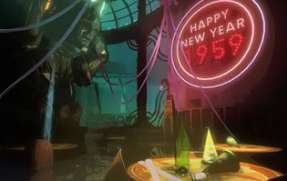
Editor’s note: As the Bitmob staff’s de facto DJ, I couldn’t agree with Eric more: A game’s aural choices are just as important as its visual choices. Also, a good story will only get you so far if a title’s soundtrack cues fall flat. Eric’s cites examples from several top-tier franchies that present a strong case. -James
[aditude-amp id="flyingcarpet" targeting='{"env":"staging","page_type":"article","post_id":652815,"post_type":"story","post_chan":"none","tags":null,"ai":false,"category":"none","all_categories":"games,","session":"D"}']
You’ve just saved the princess after slaying hordes of monsters, and she requests one last deed to end evil forever and ensure the safety of the kingdom. You pack up your belongings, scabbard your mighty sword, and mount your trusty steed in preparation for one last quest to kill the final boss. The drums are beating, the gongs are chiming, and the horns are roaring. “Epic” has never sounded better. But what makes it legendary?
More than one factor plays a role in creating ambiance when exploring a hidden temple, experiencing a emotionally moving cutscene, or going toe-to-toe with that final boss in the end — it’s not just the story. It’s the power of music.
The soundtrack of a video game can create a profound sense of player immersion that depends on the scenes matched with it. Take Bioshock for example: Rapture’s beautiful and creepy corridors, ball rooms, and apartments are the perfect complement to the games eerily memorable ’40s tunes. The sense of being a part of a great cause in Mass Effect 2 shines due in part to its music, too — the songs are full of orchestrated melodies mixed with synthesized beats that fit the setting of a sci-fi epic.
These games show that soundtrack choices can be just as important as narrative choices.
